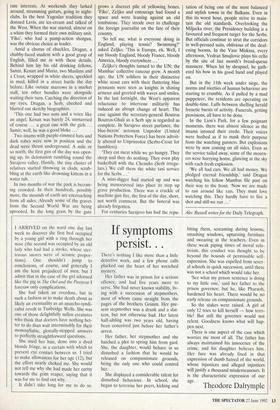If symptoms
persist. . .
I ARRIVED on the ward one day last week to discover the first bed occupied by a young girl with a ring through her nose (the second was occupied by an old lady who had had a stroke, whose ster- torous snores were of seismic propor- tions). One shouldn't jump to conclusions, of course, and generally I am the least prejudiced of men, but I admit that in the case of the girl adorned like the pig in The Owl and the Pussycat I foresaw only complications.
She had taken an overdose, but in such a fashion as to make death about as likely an eventuality as an anarcho-syndi- calist revolt in Tunbridge Wells. She was one of those delightfully sullen creatures who think that doctors have nothing bet- ter to do than wait interminably for their monosyllabic, glottally-stopped answers to perfectly straightforward questions.
She used her hair, done into a dyed blonde fringe, as a curtain with which to prevent eye contact between us. I tried to make allowances for her age (12), but the effort nearly choked me. She would not tell me why she had made her curtsy towards the grim reaper, saying that it was for me to find out why.
It didn't take long for me to do so. There's nothing I like more than a little detective work, and a few phone calls plucked out the heart of her wretched mystery.
Her father was in prison for a serious offence, and had five years more to serve. She had never known stability, liv- ing with a succession of stepmothers, most of whom came straight from the pages of the brothers Grimm. Her pre- sent stepmother was a drunk and a slat- tern, but not otherwise bad. Her latest half-sibling was two years old, having been conceived just before her father's arrest.
Her father, her stepmother and she hatched a plot to spring him from gaol. She, the daughter, would behave in so disturbed a fashion that he would be released on compassionate grounds, being the only one who could control her.
She displayed a considerable talent for disturbed behaviour. In school, she began to terrorise her peers, kicking and biting them, screaming during lessons, smashing windows, upturning furniture and swearing at the teachers. Even in these weak piping times of moral rela- tivism, this conduct was thought to be beyond the bounds of permissible self- expression. She was expelled from sever- al schools in quick succession, until there was not a school which would take her.
'See what my prison sentence is doing to my little one,' said her father to the prison governor; but he, like Pharaoh, hardened his heart. There would be no early release on compassionate grounds.
So the stakes were raised. A girl of only 12 tries to kill herself — how terri- ble! But still the governor would not relent, Goodness knows what will hap- pen next.
There is one aspect of the case which worries, me most of all. The father has always maintained his innocence of the crime, and his daughter believes him. Her face was already fixed in that expression of dumb hatred of the world, whose injustices and alleged injustices will justify a thousand misdemeanours. It is the characteristic expression of our
age. Theodore Dalrymple


















































 Previous page
Previous page